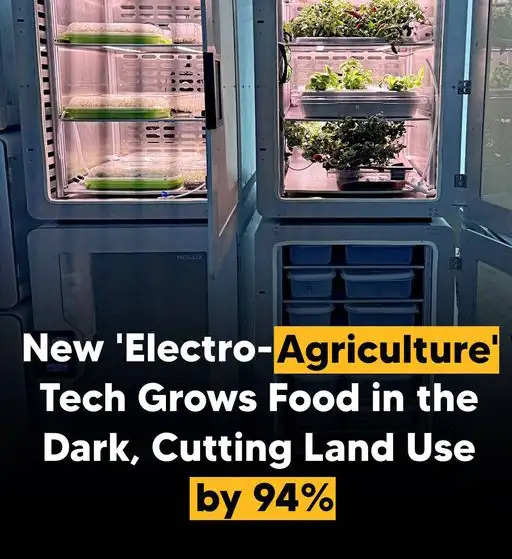Electro-Agriculture: The Future of Farming with Solar-Powered Food Production

"Electro-agriculture," a revolutionary new way to farm, could be the key to feeding everyone while having a hugely positive effect on the earth. This new system, which was created by bioengineers, replaces photosynthesis with a solar-powered process that changes carbon dioxide (CO2) and water into acetate, which plants can use as food instead of sunshine.
How it works: CO2 and water are changed into acetate by solar panels. Acetate is a chemical compound that is related to acetic acid, which is what makes vinegar taste sour. Photosynthesis is the process by which plants turn CO2 into sugar, which helps them grow. But this new way would have genetically modified plants take in acetate from their surroundings and use it as their main source of food, so they wouldn't need photosynthesis at all.
There are a lot of great perks. One reason is that electro-agriculture works much better than standard photosynthesis. Photosynthesis usually works about 1% of the time, but this new way works about 4% of the time, which is four times better. It has huge effects on food supply, especially now when climate change, limited land, and running out of resources make it hard to grow enough food.
More food on less land
One of the best things about electro-agriculture is that it can greatly decrease the amount of land that is needed for farming. Experts say that if the technology were used on a big scale, it could cut the amount of land needed for traditional farming by up to 94%. This is a huge decrease, especially when you think about how agriculture uses a lot of space and cuts down trees around the world.
With electro-agriculture, food could be grown in controlled, multi-story vertical indoor farms that make the most of room while reducing the need for huge plots of land that can be used for farming. Solar panels on the outside of these buildings would collect energy from the sun and use it to power the chemical processes that give plants inside the buildings acetate. If these farms were built in cities, food wouldn't have to be shipped over long distances, and the carbon effect of food production would go down.

A Future That Will Last Longer
There is a big environmental cost to traditional growing methods. Crops need water, fertiliser, and pesticides, all of which hurt the land, pollute the water, and release greenhouse gases into the air. Electro-agriculture is an answer because it lets people grow food in very controlled environments where water use and other resources can be carefully managed.
Also, crops wouldn't be as vulnerable to climate-related problems like droughts and floods because this method doesn't depend on the weather. This could make food production more stable, which would help lower some of the risks that come with climate change.
Because it uses solar power instead of other types of energy, the method could also cut down on the use of fossil fuels. As a result? A way to grow food that uses less energy and is better for the earth.
Could this be the way farming is done in the future?
Even though electro-agriculture is still in its early stages, it has the huge potential to change the way we grow food. It claims to help the environment, save resources, and maybe even fight food insecurity by using solar power and engineering plants to grow well without photosynthesis. If this technology can be properly scaled up, it could change the way we farm, making food production more sustainable and able to handle global problems.
As more study is done, it becomes clear that electro-agriculture might not just be a new idea, but the way farming is done in the future.
--
